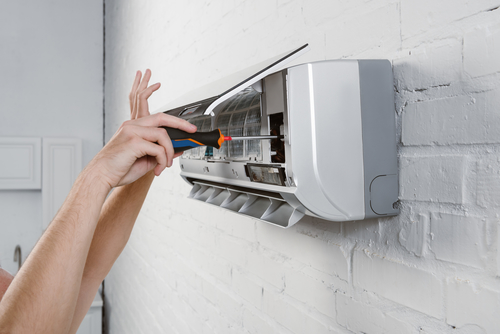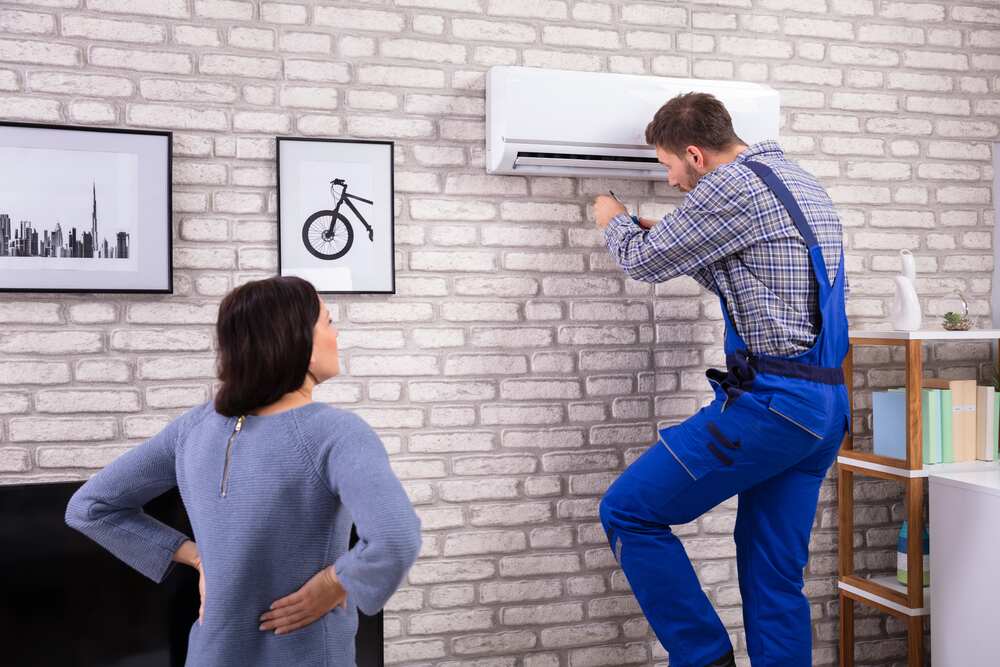When it comes to maintaining your HVAC system, it’s essential to strike the right balance between the stuff you do yourself and the stuff you rely on a licensed HVAC technician to handle. Certainly, HVAC maintenance DIY can be done and is a worthwhile pursuit if you want to save money and learn a bit more about your home’s heating and cooling system in the process. However, there are also some things you are just going to want a professional to handle. This blog post will break down what you can do on your own and what you should leave in the hands of an experienced technician.
HVAC Maintenance DIY: The Things You Can Do on Your Own

Let’s start with the DIY side of HVAC maintenance. These tasks are relatively simple and should be done with some regularity to keep your furnace, your air conditioning unit, and the rest of your HVAC system in good working order.
- Replace your furnace filter: A furnace filter exists to keep dust, hair, dirt, and other debris from making it past your return duct. Without a filter in place, all that debris would just be recirculated by your furnace’s blower fan. In other words, the furnace filter plays a vital role in preserving your home’s indoor air quality. Most HVAC experts recommend replacing your furnace filter every 90 days, but you might want to do it more often—especially if you have pets. The frequency of this maintenance task makes it an important thing to learn how to do yourself. You don’t want to be calling an HVAC technician out to your house four times a year. Fortunately, it’s not difficult to figure out what filter types your furnace needs and to order replacements online. From there, swapping out the old filter for the new one is the work of mere moments.
- Clean your house regularly: Believe it or not, cleaning your house every week or two counts as a type of HVAC maintenance. Dusting, vacuuming, sweeping, and mopping helps collect stray bits of dust and debris, keeping it out of your HVAC system. A clean house is the best defense against buildups of debris in your ducts and will help you wait longer between duct cleanings and other HVAC services. Cleaning your home will also preserve air quality and make your house a happier and healthier place to spend time. Pay particular attention to vents and heat registers, as buildups of dust or debris in these areas can indicate that the system needs more extensive cleaning.
- Checking the fins on your air conditioning unit: The outdoor part of your air conditioning system is called a condenser. The condenser oversees sucking air in, cooling it, and pumping it into the house. The outer layer of the condenser is made up of what are called fins. Over time, the fins of a condenser can become clogged with debris, from dust and pollen to grass clippings all the way to spiderwebs. Cleaning the fins of your condenser unit will help it perform more efficiently, and you can do it easily with your vacuum’s soft-bristle brush attachment. Be careful, though: fins are fragile and can easily be bent if you don’t clean them gently.
- Pay attention to what your HVAC system is telling you: The best thing you can do for your HVAC system is to heed the warnings it is giving you. An HVAC professional can’t help you if you don’t call for help, and you can’t call for help unless you know something is wrong. So, pay attention to the heat or air conditioning in your home. Do temperatures feel comfortable and consistent, or do they fluctuate depending on where you are in the house? Is your system making weird noises? Have you noticed an uptick in utility bills that might be associated with a drop in furnace or air conditioner efficiency? Tuning yourself to these warning signs can do as much to keep your system in good condition as any HVAC maintenance DIY project.
When to Leave HVAC Maintenance to the Professionals
As you can probably see, most of the DIY maintenance tasks listed above fall into the category of basic upkeep and system care. When it comes to more in-depth diagnostic, repair, or cleaning work, though, you are going to want to call an HVAC professional. A qualified technician has the knowledge and experience to identify the cause of the problem quickly and the equipment and know-how to fix it safely and effectively. Needless to say, it’s not a good idea to start taking apart your air conditioning unit if you know nothing about the design or structure of an air condition system. At best, you could void your warranty or cause more damage than you fix. At worst, you could endanger yourself and your family. Letting a skilled technician do the work will yield better results without hurting your unit or anyone in the vicinity. However, by knowing the basics of HVAC maintenance DIY, you will hopefully be able to extend the lifespan and quality performance of your system, avoid breakdowns, and extend waits between repair service calls.
FAQ Section: DIY HVAC Maintenance
1. What HVAC maintenance tasks can I do myself?
As a homeowner, you can handle basic HVAC upkeep such as replacing your furnace filter, cleaning air vents, and checking the outdoor condenser unit for debris. Tasks like dusting the fins of your air conditioner or vacuuming out ducts can significantly improve airflow and efficiency. While these tasks are simple, regular attention to them can extend the lifespan of your HVAC system. For more complex issues, like refrigerant leaks or electrical problems, leave the work to a professional.
2. How often should I replace my HVAC filter?
It’s recommended to change your furnace filter every 90 days, but more frequent replacement may be necessary if you have pets or allergies. Clean filters keep dust and debris from circulating in your home, improving indoor air quality and the efficiency of your HVAC system. Using high-quality filters, and swapping them out regularly, can also reduce energy bills by up to 15%. Keep an eye on filters to ensure they’re clean and functioning optimally.
3. What happens if I don’t clean my HVAC system regularly?
Neglecting HVAC cleaning can lead to clogged filters, dirty coils, and blocked air ducts, reducing efficiency and increasing energy costs. Over time, debris buildup can strain your system, shortening its lifespan and potentially causing costly repairs. Dirty systems can also trigger allergies and other respiratory issues due to the circulation of dust and contaminants in the air. Regular maintenance helps avoid these problems and ensures your system runs smoothly.
4. Can cleaning my house help maintain my HVAC system?
Absolutely! Regular cleaning reduces the amount of dust and debris that enters your HVAC system. Dusting, vacuuming, and mopping prevent particles from accumulating in ducts and on filters, helping to improve airflow. Pay extra attention to cleaning around vents and registers, as dust buildup in these areas can signal a need for professional duct cleaning. A clean house not only promotes better HVAC performance but also supports healthier indoor air quality.
5. How do I clean the fins on my air conditioner?
The fins on your AC condenser can collect debris like dust and pollen over time, affecting airflow. To clean them, use a vacuum with a soft-bristle brush attachment. Gently clean the fins, avoiding bending them as they’re quite fragile. Regular fin cleaning helps keep your AC unit running efficiently and extends its life. If the fins are heavily bent or damaged, consider contacting a professional to repair or replace them.
6. How can I tell if my HVAC system needs professional maintenance?
Keep an ear out for unusual noises like banging or rattling, and pay attention to inconsistent temperatures or rising energy bills. These are signs that your HVAC system might need professional inspection. If you notice that one room is hotter or cooler than others, or if your system seems to cycle on and off frequently, it could indicate underlying issues like duct leaks or thermostat malfunctions.
7. Is it safe to clean my HVAC ducts by myself?
While some homeowners attempt to vacuum their air ducts, it’s generally safer and more effective to have a professional duct cleaning every 3-5 years. DIY duct cleaning might not remove all debris, and improper techniques can damage ducts or release dust into your home. Professional cleaning involves specialized equipment and techniques that remove allergens, dust, and mold effectively, improving your system’s efficiency and indoor air quality.
8. Why should I hire an HVAC professional for certain tasks?
Certain tasks, like refrigerant recharging, electrical repairs, and deep system cleanings, require a trained technician. Attempting these tasks without the right expertise can void warranties, cause further damage, or even pose safety risks like electrical fires. HVAC professionals have the experience and tools to diagnose and fix problems efficiently. Plus, regular professional maintenance can increase the lifespan of your system by up to 40%.
9. How can I improve the efficiency of my HVAC system?
Improving your HVAC system’s efficiency starts with simple tasks like changing filters regularly and cleaning vents. You can also invest in a programmable thermostat to regulate temperatures when you’re away, which can save up to 10% on heating and cooling costs. Sealing gaps around windows and doors, and insulating your home, can prevent temperature fluctuations and reduce the workload on your HVAC system, boosting its efficiency.
10. What’s the best way to prevent HVAC breakdowns?
The best way to avoid HVAC breakdowns is through proactive maintenance. Change filters, clean coils, and have regular professional inspections, especially before the start of the summer and winter seasons. Most breakdowns occur due to neglect—debris clogs, dirty filters, and worn-out parts strain your system. Preventive maintenance can save you up to 20% on costly repairs and help you catch minor issues before they turn into major failures.


